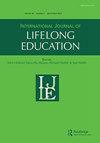Subjectivities of the lifelong learner in ‘humanistic generation’ - Critical policy analysis of lifelong learning policies among discourses of UNESCO, the Council of Europe and the OECD
IF 1.9
Q2 EDUCATION & EDUCATIONAL RESEARCH
引用次数: 1
Abstract
ABSTRACT Lifelong learning has for decades been considered a ‘holy grail’ that can help resolve societal problems and boost the economy. The current hegemonic discourse surrounding lifelong learning has included economic objectives since at least the 1980s; however, this has not always been the case. At least three different conceptual generations have been distinguished throughout the history of the politics of lifelong learning: humanistic, economic and ‘soft’ economic. In this article, we examine the politics of lifelong learning in the humanistic generation. Our research comprises eight policy texts from UNESCO, the Council of Europe and the OECD. We apply Foucauldian approach with the aim of understanding the subjectivity types of lifelong learners that have been constructed within the policy texts. We apply Carol Bacchi’s ‘What is the problem represented to be?’ (WPR) method together with Foucauldian elements of ethical relations as a new modified tool for analysing educational policy texts. The study enhances our understanding of current lifelong learning discourses by analysing their ‘humanistic roots’ and subjectivities in the humanistic era. Moreover, it challenges the extent to which the politics of lifelong learning was considered humanistic at that time.终身学习者在“人文一代”中的主体性——联合国教科文组织、欧洲委员会和经合组织话语中终身学习政策的批判性政策分析
几十年来,终身学习一直被认为是一个“圣杯”,可以帮助解决社会问题和促进经济发展。至少自20世纪80年代以来,当前围绕终身学习的霸权话语就包括经济目标;然而,情况并非总是如此。在终身学习政治史上,至少有三代不同的概念派被区分开来:人文主义、经济主义和“软”经济主义。在这篇文章中,我们考察了人文时代的终身学习政治。我们的研究包括来自联合国教科文组织、欧洲委员会和经合组织的八份政策文本。我们采用傅尔方法,目的是了解政策文本中构建的终身学习者的主体类型。我们应用卡罗尔·巴奇的“问题表现为什么?”(WPR)方法,以及作为分析教育政策文本的新修改工具的道德关系的傅科元素。本研究通过分析当前终身学习话语在人文时代的“人文根源”和主体性,增进了我们对其的理解。此外,它还挑战了终身学习政治在当时被视为人文主义的程度。
本文章由计算机程序翻译,如有差异,请以英文原文为准。
求助全文
约1分钟内获得全文
求助全文
来源期刊

International Journal of Lifelong Education
EDUCATION & EDUCATIONAL RESEARCH-
CiteScore
3.10
自引率
27.80%
发文量
40
期刊介绍:
The International Journal of Lifelong Education provides a forum for debate on the principles and practice of lifelong, adult, continuing, recurrent and initial education and learning, whether in formal, institutional or informal settings. Common themes include social purpose in lifelong education, and sociological, policy and political studies of lifelong education. The journal recognises that research into lifelong learning needs to focus on the relationships between schooling, later learning, active citizenship and personal fulfilment, as well as the relationship between schooling, employability and economic development.
 求助内容:
求助内容: 应助结果提醒方式:
应助结果提醒方式:


